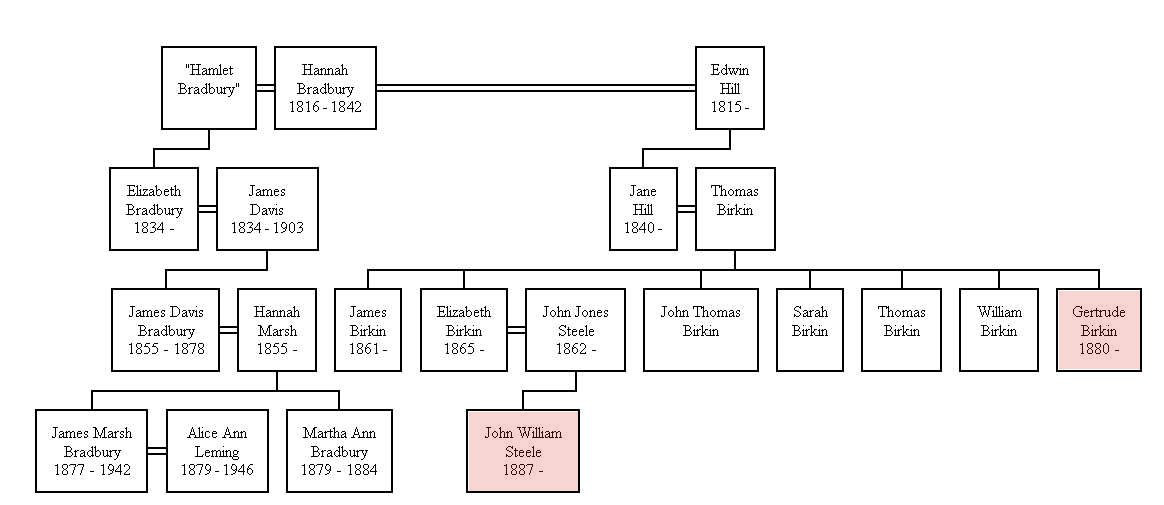- Details

My maiden name is Bradbury; my Dad knew his grandfather, James Marsh Bradbury. It was relatively easy to identify his parents: James Davis Bradbury and Hannah Marsh. The interesting point was that their marriage certificate identified James's father as James Davies. Was this his real father or his step father?
James Davies married Elizabeth Bradbury in Northwood, Hanley, Staffordshire on 5th August 1855. The 1861 and 1871 censuses show the younger James, known then as Davies, living with his parents, James and Elizabeth. Ages and occupations are strong indicators that this is the family of James Davis Bradbury and their address, which remained the same through to at least 1901 (census records), is where my grandfather William Marsh Bradbury was born in 1904.
My first thought was that James jnr was officially registered as Bradbury because his parents were unmarried at the time of his birth. It even raise the question of whether James Davies was the natural father at all. From the age on his death certificate (23 in November 1878) James D Bradbury would have been born in 1855, the year of his parents marriage. Several searches of the full BMD index revealed no James Bradbury born in the correct area for 1855 nor in any of the two years either way, but they did reveal several James Davies's. One of these was born on 4th April 1855 and his parents were James Davies and Elizabeth Davies (formerly Bradbury). Although the birth was before the marriage, it doesn't seem to have prevented James jnr being registered with his father's surname. So why did he, after being known for nearly 20 years as Davies, begin to use the name Bradbury when he married and had children? If normal convention had been followed our name would have been Davies.
James's mother, Elizabeth Bradbury, also seems to have taken her mother's surname. So far I have been unable to identify any definitive birth records for her or positively identify her in any census prior to 1861 when she was already married. She was born about 1835 and on her marriage certificate her father is named as Hamlet Bradbury, a potter. It seems increasingly likely that he was a fiction for the sake of appearance. However tracing the ancestors of relatives of James and Elizabeth [Gertrude Birkin (neice b 1880) and John William Steele (nephew b 1887)] living with them in 1901 uncovers a Hannah Bradbury who married Edwin Hill. The 1841 census shows that a 6 year old Elizabeth was living with Hannah and Edwin and one year old Jane Hill, but the surname is difficult to read. It may be Brendly or Bredby - which potentially could be a mis-representation of Bradbury. It is most likely, but not certain, that Hannah was Elizabeth's mother and Jane Hill her half sister. If so, Hannah was unmarried at the time she gave birth to Elizabeth. Hannah Bradbury was the daughter of William, a butcher, most likely from Ashbourne, Derbyshire.
- Details
In fact it turned out that there was no mysterious Colonel Hallows. The family story, which claimed Hallows was a Colonel in India, and left his wife and family well off following his death, was inaccurate although not without foundation.
Mary Elizabeth Hallows, 2nd great-grandmother to my first husband James A Andrew Baker, was the daughter of Thomas Hallows and Sophie Jenour.
Sophie was born in Carnpore, India in about 1820 and it is very likely that her father was a lieutenant Thomas Jenour of 14th Buckinghamshire Regiment, 2nd battalion. Her marriage certificate shows that her father was indeed Thomas Jenour, although by the time of her marriage his occupation was scripture reader and not an army officer.
There is a pallots marriage record of Thomas Jenour's marriage to Mary Cole in Newport, Hampshire on January 19th 1813 and also a record of him passing through Malta in 1810 either travelling to or returning from India.
Assuming that the family account of an ancestor who was an officer in the British army, serving in India is correct, then from the information gleaned from the records, this is the most likely explanation.
As for being wealthy, Thomas Jenour was probably the son of Joshua Jenour a once wealthy London newspaper publisher, although he reputedly spent his vast fortune and left his family improverished. However, improverished is probably a relative term and to their neighbours in the north west of England in the late 19th century Sophie Hallows, his daughter, may have seemed to have more comfortable means than most. However, at the time of writing I have no evidence one way or the other about their financial or social status.


